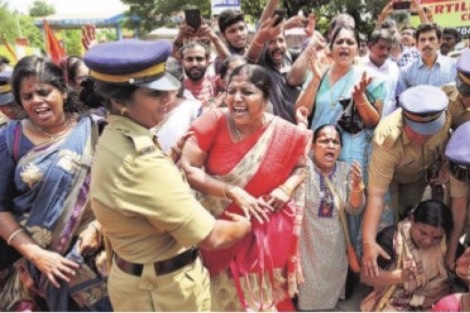
It’s that time of the year again and we are discussing that time of the month again. The Navratris are here and as the nation gears up to worship the female form, her right to worship because of her femininity is being debated.
These ten days ( and nine nights !) are a celebration of womanhood, the sacred time when even the most chauvinistic misogynists will bow their heads to the divine feminine. Perhaps it’s easy to revere a woman when she is up there on a pedestal, stoic and powerful, yet smiling benevolently, multitude of hands frozen in the act of blessing, giving and forgiving. It’s the real women seeking equal opportunity that are harder to handle. But my thoughts are not about the hypocrisy behind this practice and the mistaken belief that Devi Pooja is a proof that women are cherished in our society.
Going off tangentially I want to draw the readers attention to another contradiction. For a society that worships goddesses in the form of the divine mother, Devi Ma, our attitude towards menstruation, an essential part of reproductive physiology is appalling. For a country which feels that a woman is incomplete without motherhood we look down upon this bodily function that makes child bearing possible. We don’t want to talk about it, we don’t accept is as normal and worst of all we consider it as unholy and impure.
Any deviation from this ancient belief is met with resistance. The recent Supreme Court judgement to allow women of reproductive age enter the Sabarimala temple has generated mixed reviews. While many hailed it as a much needed move towards women empowerment and equality others have labelled it as an unnecessary intrusion into personal law. I disagree with both. Does lifting the ban improve women’s stature? Will the ruling bring hordes of menstruating women to the Temple’s compound? I doubt it. Because beliefs and rituals need social sanction more than legal right. Till society accepts certain practices laws can’t achieve much.
But the judgement is significant because it shuns the medieval belief that menstruating women are unclean and need to be segregated. It breaks the taboo of considering menses a recurring monthly cooties, a domestic quarantine wherein women are excluded from social and cultural engagements.
This social ostracisation has practical, physical and mental consequences. Girls grow up ashamed of a physiological function and consider it a curse. Due to the perceived stigma and inadequate sanitation facilities one fourth girls drop out of school after attaining menarche, thus reducing their potential. The physical repercussions are even more alarming. A recent study indicated that a majority of Indian women don’t have access to hygienic menstrual care products. They use old rags, sand, sawdust, leaves, ash and even newspapers to absorb the flow. The practice of using cloth which is otherwise acceptable becomes a health hazard due to the need to hide it. Sun drying that is an effective disinfectant is not an option because of the associated stigma. From these unhealthy practices stem a majority of gynaecological infections and diseases. To improve this situation women need to be educated about menstrual hygiene. It goes without saying that unless the state subsidises sanitary products teaching the poor about their necessity will achieve little.
Lastly, men need to be sensitised to the issue so that they can become a support system. I thought this was impossible till recently a male colleague recounted his adolescent son’s reaction when he was teaching him reproductive biology. The young boy said that he already knew that females had a difficult time due to social norms but was unaware that biologically too their life was tough. A sentiment which he will hopefully carry into adulthood. So men may be men but we can at least teach our boys!
In the end only a proactive multi prong strategy will help. The saga of menstrual blood is not as trivial as it sounds, because it is deeply embedded in religious and cultural practices and thus has far reaching effects on our nation’s well being.
(published in my column in the Tribune on 13/10/2018)
Dear Manju, great article, well analysed plight of women. Very impressive!
Did this stem from the fact that since the early man was essentially tribal with animal instincts, this was promoted to “protect” rather than insult women. We need to understand it better.
Also, would like you to delve more deeply into this issue of menstruation, it was not just the Hindus but every religion be it Christianity, Islam or Judaism who said menstruaion was unholy and touching women at that time was unclean and unholy!
It’s something like the Menopause theory – they had to look after the children hence periods stopped.
Agree with everything regarding dogmas& beliefs and possibly reforms. Just want to talk about sustainable management. The blind promotion of sanitary pads is playing havoc with our environment. There are super absorbent sustainable solutions available in the Delhi, Banglore, in association with Rotary we are open to link anybody who is compassionate & understands its impact on environment.
Great writing as always. Congratulations!
I feel both women and men need to be educated as it is the women in the domestic set up who propagate discrimination during these holy 5 days that their daughter and daughter-in-laws are compelled to follow.
Should nt the education of the same at school level be strengthen ed-!
Manju wonderfully penned down ur views
Wonderfully thoughtful provocation (as usual) …..Get it published in Hindi so that it reaches to the masses who actually need to read this..,,
True that.What to say about boys,even many girls and womrn are embarrassed and on the defensive,whenever menstrual hygiene is discussed.This and related topics have to be brought out ,in open discussion and accepted as routine part of life.
Wonderful Manju. Well said.